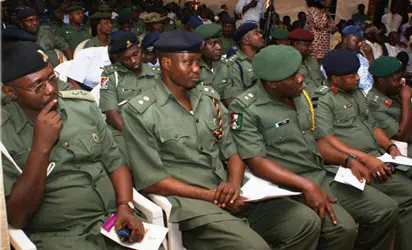Last week, I made a case for Nigerians to support our armed forces as they confront the greatest security challenge facing the nation since the Nigerian Civil War. I illustrated my narrative with examples drawn from my years of encountering our valiant soldiers in far-flung areas of the world.
No Nigerian who encountered the NIGBATT in Nyala, South Darfur, that would not have been impressed with the organisation of the camp; the general cleanliness and order; the deployment of modern communication gadgets and the innovative spirit in the field. I saw the practical deployment of our forces during a Route Assessment Patrol that took us several kilometres from the camps of Nyala.
Nigeria’s army prided itself on its regimental tradition and was always conscious of its leadership role amongst other armies in Africa. I received testimonies to that effect from other African soldiers.
It is therefore a source of worry that the army that received plaudits from around the world has arrived at the critical juncture today when soldiers are refusing to engage insurgents and are even being court-martialed for mutiny.
There are serious underlying problems to deconstruct, for the army’s sake and of the country’s. Unfortunately, these issues are out in the open. Appearing before the US House of Representatives Committee on Foreign Affairs last Wednesday, Sarah Sewall, Under Secretary for Civilian Security, Democracy and Human Rights, noted that corruption is hindering Nigeria’s efforts at ending the Boko Haram insurgency.
The military “must overcome entrenched corruption and incompetence” to be able to rescue the abducted Chibok Girls. Despite Nigeria’s $5.8 billion security budget for 2014, Sewall said: “Corruption prevents supplies as basic as bullets and transport vehicles from reaching the frontlines of the struggle against Boko Haram”, adding that: “Morale was low and (…)desertions were common among soldiers in the 7th Army Division fighting the insurgents”.
If that is a view from outside, Nigerian newspapers also reported lamentations by the military, of “the negative impact of inadequate funding for military operations”, in the North East. The disclosure came from Major General Abdullah Muraina, Chief of Accounts and Budget of the Nigerian Army, at a training programme in Jaji, Kaduna State.
The General said: “Ethno-religious crisis and terrorism has left serious financial demand on the Nigerian Army”. The Nigerian Army was “enmeshed in the bureaucratic bottleneck for funding approvals for military operations”.
The “budgetary allocation for the military is inadequate to meet the contemporary security challenges and also cater for the welfare of the Nigerian Army”. To explain the magnitude of the problem, General Muraina said: “This year N4.8 billion was allocated for capital projects for the Nigerian Army. Of this amount, because of security challenges, the army decided to buy ballistic helmets and fragmented jackets (two items) for 20, 000 soldiers, at a cost of $1500, it will amount to N3 billion.
Meanwhile, about nine items are needed for the soldiers”. The sum of N3 billion is more than 50% of the capital budget of N4.8 billion, and as the officer noted, that is just only an item of expenditure.
It gets even more curious, to read in LEADERSHIP newspaper of Saturday, May 24, 2014, that the Ministry of Defense, MoD, washed its hands off allegations of corruption related to underfunding or ill-equipment being alleged in the military, because the military “receives its capital expenditure direct…while the Presidency releases money to the military without the involvement of the ministry”.
An unnamed source added that: “The ministry knows little or nothing about how the military spends its capital votes…We know next to nothing about how the military spends its money…
The military purchase their arms and ammunition by themselves and, as we are talking now, some of them are in Turkey shopping for APCs”. The anonymous source was asked about underfunding by the Presidency, he answered that: “We may not know here; probably the military is in the best position to say this”.
Well, THE NATION newspaper of the same day had the answer. Finance Minister, Ngozi Okonjo-Iweala, confirmed that: “The military received N130.7 billion between January and April, 2014, while another N3.8 billion had been approved…but was still being processed…”.
The N130 billion Ngozi Okonjo-Iweala said she released in the first four months of 2014, obviously piqued the Sultan of Sokoto, Alhaji Sa’ad Abubakar, a retired General himself.
Addressing an event last weekend, the Sultan said to his audience: “If you have been reading newspapers recently, the Minister of Finance…said over N130 billion was given to security agencies in four months. Now where is the money? These are questions we should be asking ourselves”.
And just in case there are people about to question his position on this, the Sultan reminded that: “I spent most of my life in the military”! There are too many sordid details that are not clear to us in respect of provisioning of our troops and the spending of budgeted monies. A combination of acts of corruption, impunity, crass irresponsibility and gross incompetence are rubbing negatively off our fighting men and women.
Those in charge must be held accountable for the opprobrium that is being visited on our armed forces today. We must insist that our troops are properly provisioned to be able to carry out their duties of securing Nigeria and Nigerians effectively!


